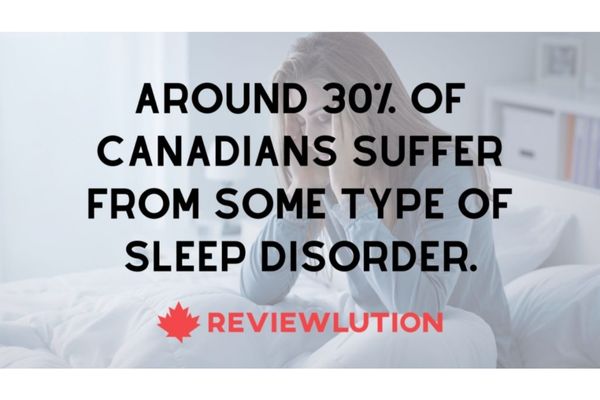23+ Sleep Statistics for Canada [Infographic]
Table of Contents
Just one more episode, only one more video clip, or a to-do list that still has items on it, maybe even that nightcap we thought would relax us.
All of those can cause sleep disturbance and rob us of a restful night. Insufficient sleep is prevalent worldwide, as half of the global population struggles to get the recommended amount of hours.
Sleep statistics for Canada reveal one in five Canadians wake up without feeling refreshed.
Overworked and stressed, we often notice sleep issues last. But not getting enough sleep can lead to weight gain, diabetes, anxiety, depression and cardiovascular disease, just to name a few.
Here’s what we’ve found researching sleep – Canada not only has trouble falling and staying asleep but also staying awake during the day.
The thing is:
One in three Canadians struggles not to doze off before evening comes.
With that in mind, let’s have a look at the latest stats.
Fascinating Sleep Statistics (Editor’s Choice)
- Adults need seven to nine hours of sleep.
- 35% of Canadians have trouble falling asleep and staying asleep.
- Canadian women sleep 7.24 hours per night on average.
- 55% of adults find sleep refreshing most of the time.
- 55% of women have trouble falling asleep.
- Canadian teenagers sleep only 6.5 to 7.5 hours.
- We spend two hours every night dreaming.
- On average, Canadians wake up around 7 am.
- A 10% increase in body weight raises the risk of sleep apnea by six times.
- 20% of Canadians have fallen asleep at the wheel in the past year.
Sleep Health Statistics Canada
1. An adult person needs between seven and nine hours of sleep.
(Source: Statistics Canada, Healthline)
The amount of recommended sleep for adults ranges from 7 to 9 hours, looking at the group aged 18 to 64. Seniors over 65 need one hour less and should sleep 7 to 8 hours a night to have the ideal amount of sleep.
Some say the minimum amount of sleep is four hours, and allegedly, British Prime Minister Margaret Thatcher used to live like that. Still, that’s hardly an ideal work-life balance.
2. One in three Canadians aged 35 to 64 report not getting enough sleep.
(Source: Statistics Canada, Statistics Canada)
One in four adults aged 18 to 34 and 65 to 79 report not getting enough sleep. In the age group from 35 to 64, one in three say the same.
Now:
Higher education and income seem to go hand in hand with getting the recommended amount of sleep. Highly educated and more affluent Canadians aged 18 to 64 are more likely to get an optimal amount of sleep.
Among senior citizens, education is not of significance – but money is.
The difference between men and women also fades with age. In the senior group, we can see that both sexes’ amount of sleep is very similar. On average, seniors aged 65 to 79 said they sleep 7.24 hours per night.
Finally, some 15% are sleeping for more than eight hours, and one-third reported sleeping less than seven hours.
3. Women sleep longer than men, 7.24 hrs per night on average.
(Source: Statistics Canada)
According to a 2005 General Social Survey which included respondents over 15 and older, the difference in the amount of sleep in one night between men and women was significant, with men getting 8.1 hours and women 8.3.
Both groups were sleeping less in the following survey cycle in 2013 when the result was 7.24 hours for women versus 7 hours for men.
Overall, 35% of Canadians had issues falling asleep and staying asleep, according to the Canadian Community Health sleep research.
4. 43% of men have trouble going to sleep or staying asleep.
(Source: Statistics Canada)
A Canadian Health Measures Survey found that 43% of men and 55% of women aged 18 to 64 have problems falling asleep or trouble staying asleep. In the previous study cycle, in 2005, this percentage was 25% for men and 35% for women.
Still, the methodology in studies from 2005 and 2015 wasn’t entirely the same, and the results might not be fully comparable.
5. 55% of adults say sleep is refreshing most of the time.
(Source: Statistics Canada, Casper)
Quality of sleep can be measured by duration and the ability to fall asleep and stay that way as well as the well-being you feel from getting the recommended hours of sleep. There is a link between getting the right number of hours and sleep quality. Too much or too little leads to feeling tired.
The thing is:
If you keep a regular sleep schedule, you’re 1.5 times more likely to get proper rest and feel refreshed. Click To TweetAround 79% of seniors grade their sleep as refreshing “most of the time” or “always.” The percentage drops to 55% in the group aged 18 to 64.
Finally, some 33% of adults say they feel sleepy and have trouble staying awake during the day, and the same goes for 30% of seniors.
6. Babies need 12 to 17 hours of sleep every day.
(Source: Sleep Foundation)
And if they’re born before prematurely, babies will sleep 90% of the time.
Facts about sleep for children show that the amount of sleep needed gradually decreases over time. Before starting school, this amount should be anywhere from 10 to 13 hours, and children of school age should sleep 9 to 11 hours. By the time they are teenagers, sleep time decreases by 50 minutes.
Nightmares are frequent between ages 3 and 6 when around 50% of children experience them. Interestingly, up to 27% of kids snore.
Around 25% of children have sleep problems or are sleepy during the day, and 70% with ADHD experience sleeping difficulties.
7. In 20 years, a whole generation of Canadians might be affected by the lack of sleep they got as teenagers.
(Source: CBC)
Teenagers should get anywhere from 8 to 10 hours of sleep, according to the Canadian Paediatric Society.
That being said:
Teenage sleep statistics for Canada show the number is a lot lower, only 6.5 to 7.5 hours.
Functioning below optimal levels for years can leave long-term consequences. Both evening and morning routines are being reexamined. The use of electronic devices in the evening is a bad practice as is an early start of classes.
8. People spend about two hours per night dreaming.
(Source: Sleep Foundation, Casper)
Once we’re over 10, we dream four to six times during one night, which amounts to two hours of dreaming.
Up to 50% of the content of what we dream is lost within the first 5 minutes upon waking. By the time we get up, almost everything will have evaporated – a full 95% of our dreams will be gone. This is why dream journaling is recommended first thing upon waking.
As one of the curious sleep facts, researchers found that around 65% of dreams are sad or angry, while 20% are happy and excited. 70% of respondents report having a lucid dream at least once.
What’s more:
Men dream about other men more frequently, 70% of the time, while women have equal numbers of men and women in their dreams.
9. Metabolism slows down by 15% during the REM phase.
(Source: Sleep Foundation)
The body slows down and cools off, body temperature dropping by one to two degrees Fahrenheit.
During one night of sleep, people go through four to six cycles of sleep. The REM phase takes up around 20 to 25% of sleep time.
10. Most people sleep on their side 54.1% of the time.
(Source: Sleep Foundation)
People spend around 37.5% of the time sleeping on their back and just 7.3% sleeping on their stomachs.
11. On average, Canadians wake up around 7 am.
(Source: Statistics Canada, The Telegraph, Edison Research)
Every country has its own average wake up time. Canada usually wakes up at 6:54 am
This pattern falls right in the middle between the UK and the US. Americans mostly wake up around 6:30, while Brits get up at 7:33 on average.
12. 21% of car accidents happen due to fatigue.
(Source: Canada Safety Council, CBC)
The group that often gets the least sleep is middle-aged men. They get less than a minimum of seven hours, and one of the crucial problems is that they make up for a sizable portion of active drivers.
Here’s the scoop:
Science Advances Journal analyzed around 6,000 people in over 100 countries, and the results show that driving tired is very similar to driving drunk.
Up to 20% of Canadians admit they have fallen asleep at the wheel at some point during the past year, sleep statistics for Canada tell us.
Some 21% of car accidents happen due to fatigue. The death toll is 400 people a year, and around 2100 serious injuries result from collisions that occurred while the driver was tired.
Sleep and Mental Health in Canada
13. Around 30% of Canadians suffer from some type of sleep disorder.
(Source: CBD, NHS, The Sleep Foundation)
Sleep disorder statistics for Canada show that sleep issues are not the same in men and women. Almost a third of Canadians have difficulties with sleep. A typical male problem is sleep apnea, while women tend to experience conditions such as restless leg syndrome or other mental health issues like anxiety and depression.
The restless leg syndrome affects 5% to 10% of adults and 2% to 4% of children; it often starts during pregnancy in women.
The lifetime risk of chronic insomnia in women is 40% higher than in men.
Common signs of insomnia are:
- Difficulties falling asleep
- Waking up multiple times during the night
- Not being able to go back to sleep after waking up in the middle of the night
- Waking up too early and not being able to sleep any longer
- Not feeling rested after a night of sleep
- Not being able to nap despite feeling tired during the day
- Irritability and daytime fatigue
- Lack of concentration
14. People who have insomnia have a seven-time higher risk of work-related accidents.
(Source: Sleep Foundation)
Severe insomnia can make people prone to work-related accidents due to a lack of focus and attention.
The amount of errors nurses make if they work longer than 12.5 hours is three times higher than those working 8.5-hour shifts.
15. Only 13.4% of Canadians were suffering from insomnia symptoms in 2002.
(Source: Statistics Canada, Sleep Foundation)
Insomnia statistics show children and teenagers don’t suffer from this type of disorder too often.
Most likely to suffer from an inability to fall and stay asleep are women with lower education and lower income.
As one of the most common sleep disorders in adults, insomnia is increasingly becoming an issue for many. Between 2007 and 2015, the number of insomniacs went up by a whopping 42%.
A large proportion of people taking sleep medication, including medical marijuana, report side effects. Up to 80% said they had focus issues or trouble waking up.
16. Sleep stats reveal that 501 million adults have mild obstructive sleep apnea.
(Source: RTSO, Casper, The Sleep Foundation)
A further 435 million have a moderate to severe variation of this sleeping disorder.
Now:
Sleep apnea statistics for Canada from 8,647 people found 3% have an OSA diagnosis and 30% are at high risk. This sleep survey did not include all northern territories, aboriginal settlements, and members of the Canadian Forces.
This condition occurs in only 3% of average-weight people, compared to 20% of overweight individuals. Even a 10% increase in body weight will raise your sleep apnea risk by six times.
And people suffering from this condition are also at a 45% higher risk of developing high blood pressure. Interrupted breathing is not as common with women as it is with men – only 9% to 21% of the female population suffer from it.
The prevalence of sleep apnea grows with age, as only 1% to 4% of children have it. 56% of those over 65 are at a higher risk. Click To Tweet17. 8% of people have experienced isolated sleep paralysis at least once, sleep statistics for Canada reveal.
(Source: Casper)
The body sometimes does not wake up as fast as the mind does. This results in a feeling of paralysis and, in 90% of cases, fear.
It happens most often in the age group from 20 to 40, but it can start during adolescence. Stress and the lack of sleep among students cause higher sleep paralysis rates – 28% of students report having felt it at some time. Young athletes are the most affected group, with 7% of students reporting sleep paralysis once a week.
What’s more:
Up to 32% of psychiatric patients say they have experienced it at least once.
18. 36.3% of people who lack sleep report they are chronically stressed.
(Source: Government of Canada, Casper)
In contrast, only 23.2% of adults who get an adequate amount of sleep say they are chronically stressed. And if you’re a mother, it’s even worse – every child increases the risk of not getting enough sleep by 46%.
Canadians who don’t sleep enough spend on average 4 hours seated, compared to only 3.5 hours for those who get the right amount of night rest.
19. Bad sleep leads to poor mental health in 12.3% of adults.
(Source: Government of Canada, Sleep Foundation)
To prevent this and adopt better sleep hygiene, Canada follows these guidelines:
- Aim to go to bed and wake up at the same time.
- Exercise or walk during the day. Around 75 minutes of intensive exercise or 150 minutes of moderate exercise (such as yoga) a week will help you stay focused and fight off daytime drowsiness.
- Use relaxation, mindfulness and meditation techniques to unwind.
- Sleep in a quiet, dark space.
- Avoid alcohol, caffeine, and nicotine before bed. These stay in your body long after you have had them. After five hours, only 50% of the caffeine will be out of your system. And having more than two servings of alcohol for men and one for women will decrease the sleep quality by as much as 39.2%.
- Use the prescribed sleep medication and consult your doctor.
20. There is a 48% increase in coronary heart disease with those sleeping less than 6 hours, sleep statistics reveal.
(Source: Nature)
Not getting enough sleep does the same damage as not getting enough food or exercise and is directly related to cardiovascular diseases.
The thing is:
People who sleep less than 6 hours per night have a 48% increase in coronary heart disease and a 15% increase in stroke cases.
Not getting enough sleep can be linked to diabetes, weight gain, and issues with appetite control. It is associated with neurodegenerative disease, mood changes, depression, and diminished cognitive functions.
But wait! There’s more:
Sleeping too much is just as bad. Those getting more than 8 or 9 hours had a 38% increase in coronary heart disease and a 65% increase in stroke. A full 45% increase in cardiovascular disease was recorded in the oversleeping group and, for them, it might be vital to look into how to sleep less.
21. A new mattress can improve the quality of sleep by 55%.
(Source: Casper, Sleep Foundation)
The worldwide mattress market will reach $43 billion by 2024. Getting a new mattress can improve your sleep health by 55% and lower the occurrence of back pain by 48%. Up to 93% of people believe having the right mattress is essential, with 78% being excited to go to bed with fresh sheets.
Check this out:
Sleepcountry.ca, the Canadian top mattress distributor, reached $248.9 million in revenues in Q4 2020, even with the stores closed for 10.5% of working days and with 20.1% of its sales derived from sales coming through online shopping.
22. 61% of Canadians have cancelled plans in favour of sleep.
(Source: Daily Hive)
Here are some of the miscellaneous findings of a Canada sleep survey done with Canadians under the age of 34:
- 71% use computers and phones right before going to sleep, some even going as far as falling asleep with the phone in hand.
- 15% like sleeping in a luxury hotel better than at home.
- 40% report falling asleep in a public place.
- 22% report falling asleep on public transport.
- 61% say they have cancelled plans to get some sleep.
- 50% single out snoring as the most annoying sleeping habit a partner can have.
23. Canadians are the third-most sleep-deprived nation, with 31% saying they lack sleep.
(Source: Global News)
According to sleep deprivation facts, Canada holds third place among the most sleep-deprived countries. In fact, around a third of Canadians report they are sleep deprived. The UK and Ireland are ahead, with 37% and 34% of people reporting that they don’t get enough sleep.
The United States shares the third position with Canada, with 31% of sleep-deprived people.
24. North Americans can lose up to 10 million working hours a year due to lowered performance from tiredness.
(Source: CBC, Nature)
A lot of people don’t get the normal sleeping hours; rather, their pattern is closer to 6 and under. A full 20% of Canadians sleep between 6 and 7 hours, and 6% always get less than 6 hours a night.
The thing is:
It can seem irrelevant at first glance, but once it piles up, the lack of sleep affects health, social life and work productivity. For students, this leads to a lowered academic performance.
The “combined cost of insufficient sleep” for Canada, the US, the UK, Germany, and Japan is estimated at over $600 billion per year.
In Conclusion
Consistency is everything when it comes to maintaining good sleep hygiene. And the first place to start if you are experiencing sleep problems is setting up a routine. The hardest part is resisting the phenomenon called “revenge bedtime procrastination” that has crept into our lives.
The lack of enjoyment and relaxation often pushes us to delay going to bed, leaving our smartphones or turning off the TV. When the day is finally over, many will choose what we perceive as well deserved “me time,” especially as the price will be paid in the coming months and years and not immediately.
However, as sleep statistics for Canada remind us all too well, it’s crucial to acknowledge sleep as a vital part of our wellbeing and replace the blue lights with meditation or a book.
FAQ
Adults need 7 to 9 hours of sleep. The amount of sleep changes with age and goes from 17 hours as a baby to 7 hours for seniors. Both lack and excess sleep can be harmful and lead to multiple health issues. A stable sleep routine and good sleep hygiene significantly improve the quality of life.
Several factors, such as education, income levels, habits and gender, affect the amount of sleep an average person gets every night. Canadians aged 18 to 64 sleep around 7.12 hours on average. Over 65% get the 7 to 9 recommended hours, and one-third sleep less than 7 hours. Around one-third and 6% sleep less than 6 hours per night.
Good sleep stats vary depending on your age. If you’re younger than 65, getting between 7 and 9 hours of sleep is good; for seniors, 7 to 8 hours is the norm. Sleep quality also has to do with how long it takes you to fall asleep and whether you wake up frequently during the night.
Another indicator of healthy sleep is going back to sleep quickly if you do wake up. The same goes for feeling fresh and restored in the morning.
According to sleep statistics, over 51% of adults around the world have trouble sleeping. They say they are not getting enough sleep, and up to 80% sleep in on weekends to make up for the busy week’s schedule.
Countries with a culture of sleeping in public report higher hours of rest due to naps people take on school or lunch breaks or during the commute hours. Sleep statistics for Canada show one in two Canadian adults have trouble sleeping.











